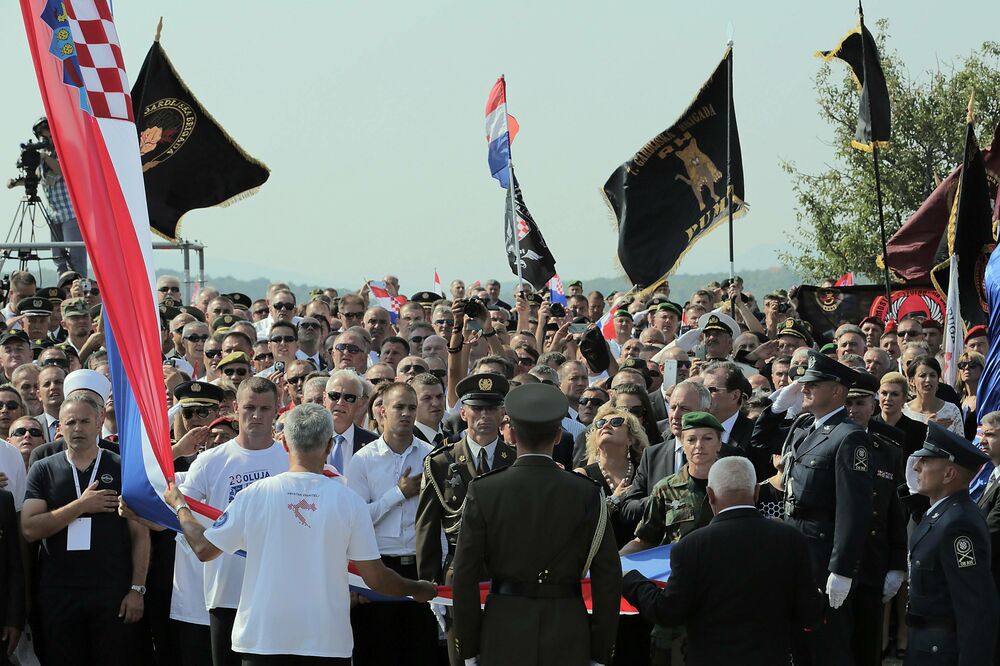What do Croats do when it's an unbearable 40 degrees outside? You think they are standing in the house, behind closed sheds in air-conditioned areas, while a heat wave burns the asphalt and causes all kinds of dangerous inconveniences. But you are mistaken, the Croats are a warrior nation, they are not afraid of an enemy much worse than that hellish heat, so these days, protected by patriotism like an impermeable raincoat, they flocked en masse to the small town of Knin, the mythical place of all-out victory over the Serbian occupier. for the 22nd time celebrated the anniversary of the Storm, the liberation action that freed a large part of occupied Croatia in just three days. In just three days? In 1995, the world's military experts were amazed, so how is this possible? And how could it not be that when the territory was "liberated" already emptied of the Serbian army, only a handful of them and part of the native Serbian population remained. Nevertheless, that walk through the abandoned land is called a heroic endeavour, a miraculous military action in which about 250 thousand of its Serb citizens left Croatia, and some of those who remained paid with their heads for their act of faith in the Croatian state.
The national euphoria and celebration of the war was scornfully provoked by Croatian television for days, talking nonsense, either through the mouths of its patriotic reporters or through the mouths of selected pro-Ustasha revisionists, those who, like parrots, condense all intelligence, truth and facts between two theses: that Croatia was created on Storms, and that that military action was clean as a tear. As if Serbian citizens had not left Croatia en masse, as if houses had not been thoroughly looted, and entire villages and hamlets had not disappeared in flames, as if Serbian civilians, mainly old men and women, had not been brutally killed... Even today, however, 22 years later, every reminder of the suffering of the Serbian population represents a diabolical act of betrayal, and rare calls for an apology for war crimes, such as the one made this year by a group of young people, result in a request to "shoot that South-Communist garbage". Yes, exactly that and a series of hysterical threats were announced by a prominent member of the ruling party, actually expressing the general position of his party, but also of the nation's good deeds.
Unfortunately, nothing good or smart was heard even on the other side of the border, because over there in Serbia sirens pompously sounded to pay tribute to the Serbs who died in the "criminal" Storm, and the former fugitive of the war criminal Slobodan Milosevic, the current president of Serbia , usually disgustingly called all Croats Ustashas, denying the bare facts that 26 years ago, Serbia, along with terrible crimes against the civilian population, was at war in the countries that Vučić's party at the time only wanted to "liberate" from Ustashas and bali for the sake of the Greater Serbia project. This is how the war victories of Croatia and Serbia are being celebrated on all sides this summer, without institutional mention of the victims of the opposite side, and the rare reminders of crimes against civilians are openly denounced as an act of high treason. In the Republika Srpska, in Bosnia, masses are held for the exiled and killed Serbs in Uloja, and in Prijedor, almost secretly, with the strong opposition of the Serbian authorities there, the anniversary of the Omarska camp, where the Serbian army tortured and killed imprisoned Bosniaks, is being celebrated.
The sediments of inter-national hatred and political revisionism stink every year anew, with no prospect that the nations in these areas will finally face the past, so that, as in Germany, a quarter of a century after the war, the process of self-sobriety will finally begin as the only path to new political and national relations. No, instead it rattles its weapons, Croatia in particular demonstrates a new militarization, so the media outlet of the ruling oligarchy, Jutarnji list, in its special edition, "Storm 2017", in an editorial, evidently written in the cabinet of the Minister of Defense, reports: "We these On the anniversary of the storm, we look to the near future, in the direction of the development of the Croatian defense industry as an important factor in the economic development of Croatia... that's why we decided to give readers an unusual poster of two soldiers fully equipped with Croatian products". And the introductory speaker goes on to talk about the world-class quality of underwear and military boots, about an assault rifle whose development has "reached such progress that today we are talking about one of the best rifles in the world". Then, under the guise of journalism, a conference on "Croatian defense industry as an export brand" is advertised, and weapons production is highlighted as a huge contribution to strengthening the competitiveness of the national economy.
Not, therefore, the production of apples, caps, shoes, ships, but precisely the weapons with which small Croatia is trying to satisfy its American mentors and their interest in the Balkans, and probably become a barrier to Russian influence in neighboring Serbia.
"Therefore," writes the editorialist and editor-in-chief of Jutarnji list, "we are proud that the international character of our conference will show how much attention is paid to the interest of common European security." That majority, in turn, reveals the fact that this media house is a co-organizer of the meeting on armaments together with the Ministry of Defense. And we traitors would like to talk about apologies to the victims, about finally closing the circles of hatred in a country with such perverted media...
(Mladina; Peščanik.net)
Bonus video:





